英语词汇学05
英语词汇学——精选推荐

LexicologyRoots Meanings Wordsa-negativeacro- heightAcu- make sharp acumen(敏锐)Acute(敏锐的,严重的,急性的) adroit clever and skillfull be ~ at agogue- leading demagogue(煽动家)demagoguery(煽动言论) agora- market place-aise ease(comfort) malaise(疾病) -Algia pain nostalgia(怀旧,思乡) altru/alter- other altruist(无私的人)alternate(轮流的) ambi- both ambivert(双性格的人)ambidextrous(双手共用的,技艺高超的)ambidexterity n. ambulo- to walk ambulatory(可移动的,步行的)perambulatory(婴儿车)perambulate(漫游,闲逛)preamble(前言,序文) ana- up anatomy(解剖学) andr male philander animus- mind equanimity(平静) Antropo- mankind anthropologist Arch- to rule patriarch(鼻祖) Articulus- joint articulate(发音,清晰)Inarticulate(由于…说不出话) Ascet- monk astetic(苦行僧)asceticism(苦行主义) Astron- star astronomy(天文)Astronomical(天文学的)Astrology(星相学)Astrologer(占星术家)AstronautAstronautics(航空学)Astrophysics(天文物理) Aster- star-shaped flower asterisk(星号) Auglu- english auglophile(亲英排) Bene- benign benign(亲切的,良性的)Benediction(祝福)Beneficent(做好事的)Benefactor(恩人,做好事的人)Benevolent(仁慈的)Beneficiary(受益人) Biblio- book bibliophile(藏书家) Bio- life biology(生物学)Biography(传记)Biopsy(活体检查)Autobiography(自传) Botan- plant botany(植物学)Botanist(植物学家) Cardi- heart cardiogram(心电图)Cardiograph(心电图仪器)Cardiologist(心脏病医生)Cardiac(心脏病的,心脏的) -cide to kill suicideSororicide(杀姐妹)Homicide(杀人)Uxoricide(杀妻)Regicide(弑君)Genocide(种族灭绝)Fratricide(弑兄)Mariticide(弑夫)Infancticide(杀婴儿) Circum- around circumlocution(迂回) Cla- to breakClaustrum- enclosed spaceCol/cor- together,with colloquial(口语的,非正式的) Com/con- together,with compareComparableComparative(相对的) Credo- to believe credulous(轻信的)Credible(可信的)Incredulous(怀疑的)Credential(证件,国书)Creed(信念,宗教信仰) Dema/demo people democracy(民主)Democrat(民主人士)Demography(人口统计学) Derm/dermat/dersim- skin epidermis(表皮)Pachyderm(大型厚皮动物)Dermatitis(皮肤炎) Dia- through diaphanous(半透明的) Dic- say,tell malediction(诅咒,诽谤) Dicho- in two dichotomyDiletare- to delightDipsa- thirstDono- to give donor(捐赠人)Condone(宽恕,弥补)Dor- back dorsum(背部)Endorse(支持,在背面写字)Endorsement(签字,代言) Ec- out eccentric(古怪的) Ego- I,self egoist(自私的)Egotist(自夸的)Egoism(自我主义)Egocentric(自我为中心的)Egomaniac(利己狂) Epi- on/upon epitome Equ- equal equivocate(说模棱两可的话)Equity(公正,股票)Equable(平稳的) Estrian- person equestrian(骑马的) Ex- out exurban(远郊的)Extro- outward extrovert(外向的人) Fatigue- to tire indefatigable(不知疲倦的)Fec/fic/fac to do or make malficent(犯罪的)Malefactor(罪犯) Fer- to bear or to carry vociferous(大声的) Fide- faith,trust bonafide(真正的,有效地)Fidelity(忠诚)Infidel(不忠的,异教徒)Infidelity(无宗教信仰的,对配偶不忠的) Frater- brother fraternize(与。
英语词汇学
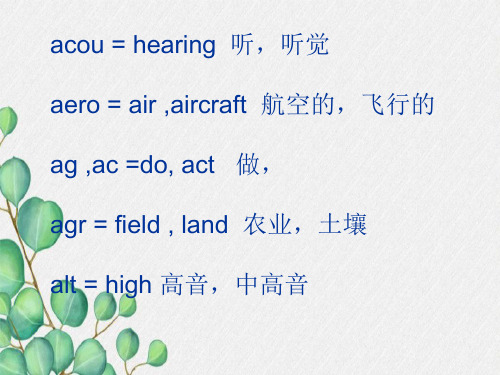
19. baro-: heavy, press
• Barogram Baro- (press) + -gram(曲
线) 气压自记曲线
• Barograph Baro- (press) + -graph(计) 自动气压记录器
Self-check
• Barometer [bə'rɔmitə] Baro-(press) + meter(计) 气压计 晴雨表 • Barodynamics Baro- (heavy) + dynamics
Guess
millennium n.
[mi'leniəm]
mill(千) +enni+um(n.词尾)→一千年
annual adj. ['æ njuəl] ann+ual(...的)→每年的
centennial adj. [sen'tenjəl] cent(百)+enni+al→adj. 一百年的
anarchy :an+arch+-y monarch:mon+arch
Aster /Astro:星 Asterisk:aster-+-isk(小) 星号 注上星号 Asterism:aster-+-ism(主义) 星群 Astrodynamics:astro-+dynamics(动力) 天体动 力学 星体航行学 Astronavigation:astro-+navigation(航行航海领 航)太空航行
Guess agronomy [ə'ɡrɔnəmi]
n.农业经济学
agrotechny ['æɡrəu,tekni] (agro+ techny技术) n. 农业加工学
英语词汇学复习题5
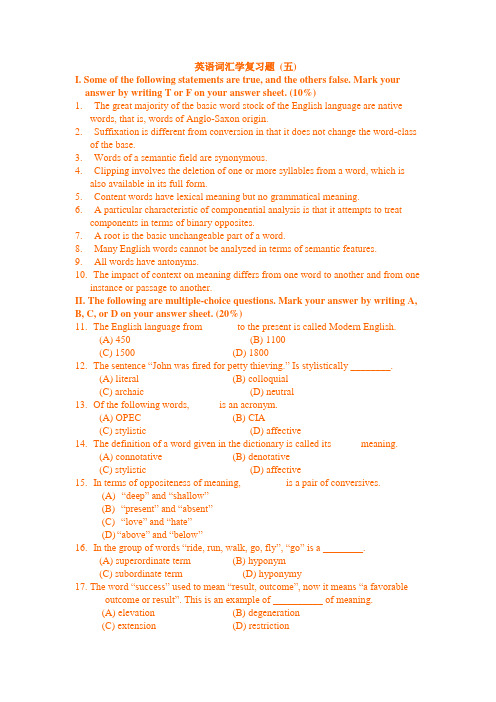
英语词汇学复习题(五)I. Some of the following statements are true, and the others false. Mark your answer by writing T or F on your answer sheet. (10%)1.The great majority of the basic word stock of the English language are nativewords, that is, words of Anglo-Saxon origin.2.Suffixation is different from conversion in that it does not change the word-classof the base.3.Words of a semantic field are synonymous.4.Clipping involves the deletion of one or more syllables from a word, which isalso available in its full form.5.Content words have lexical meaning but no grammatical meaning.6. A particular characteristic of componential analysis is that it attempts to treatcomponents in terms of binary opposites.7. A root is the basic unchangeable part of a word.8.Many English words cannot be analyzed in terms of semantic features.9.All words have antonyms.10.The impact of context on meaning differs from one word to another and from oneinstance or passage to another.II. The following are multiple-choice questions. Mark your answer by writing A, B, C, or D on your answer sheet. (20%)11.The English language from ______ to the present is called Modern English.(A) 450 (B) 1100(C) 1500 (D) 180012.The sentence “John was fired for petty thieving.” Is stylistically ________.(A) literal (B) colloquial(C) archaic (D) neutral13.Of the following words, _____ is an acronym.(A) OPEC (B) CIA(C) stylistic (D) affective14.The definition of a word given in the dictionary is called its _____ meaning.(A) connotative (B) denotative(C) stylistic (D) affective15.In terms of oppositeness of meaning, ________ is a pair of conversives.(A)“deep” and “shallow”(B)“present” and “absent”(C)“love” and “hate”(D)“above” and “below”16.In the group of words “ride, run, walk, go, fly”, “go” is a ________.(A) superordinate term (B) hyponym(C) subordinate term (D) hyponymy17. The word “success” used to mean “result, outcome”, now it means “a favorableoutcome or result”. This is an example of __________ of meaning.(A) elevation (B) degeneration(C) extension (D) restriction18. The language the early immigrants brought them to America was differentfrom present English; the greatest difference lies in ________.(A) spelling (B) pronunciation(C) grammar (D) vocabulary19. _________ serves as a typical example of euphemism.(A) “Pious” meaning “hypocritically virtuous”(B) “A mental hospital” referring to “a madhouse”(C) “A landscape architect” meaning “a gardener”(D) “Slow learners” referring to “underachievers”1.Oxford English Dictionary is a ___________ dictionary.(A) pocket (B) medium-size(C) descriptive (D) prescriptiveIII. Decide whether each of the following words is a A) simple word, B) compound word, C) derived word or D) shortened form. Mark your answer on the answer sheet. (10%)21. acidhead 26. fashion22. formal 27. recycle23. preplant 28. honesty24. lab 29. phone25. ready 30. ashtrayIV. Explain the following terms with appropriate examples. Do it on the answer sheet. (10%)31. back-formation32. polysemyV. Give a short answer to the following questions. Do it on the answer sheet. (30%)33. What is the difference between a morpheme and a syllable? Illustrate yourpoints with examples.34. Explain conventionality and motivation. Give examples.VI. Give a longer answer (150-200 words) to the following question. Do it on the answer sheet. (20%)35. Context is very important for the understanding of word meaning. How iscontext classified?英语词汇学参考答案(五)I. Some of the following statements are true, and the others false. Mark your answer by writing T or F on your answer sheet. (10%)1. T 2. F 3. F 4. T 5. F 6. T 7. T 8. T 9.F 10. TII. The following are multiple-choice questions. Mark your answer by writing A, B, C, or D on your answer sheet. (20%)11. C 12. B 13. A 14. B 15. D16. A 17. D18. D 19.B 20. CIII. Decide whether each of the following words is a A) simple word,B) compound word, C) derived word or D) shortened form. Mark your answer on the answer sheet. (10%)21. B 26. A22. C 27. C23. C 28. C24. D 29. D25. A 30. BIV. Explain the following terms with appropriate examples. Do it on the answer sheet. (10%)31. Back-formation is a term used to refer to a type of word-formation by which a shorter word is coined by the deletion of a supposed affix from a longer form already present in the language. For example, the verb “resurrect” was formed from the noun “resurrection” by removing the supposed derivative suffix “-ion”. 32. Polysemy is a common feature peculiar to all natural languages. There are words that have two or three senses, and the most commonly used ones can have as many as over a hundred. However, when a word is first coined, it is always monosemic. But in the course of development, the same symbol must be used to express more meanings, the result is polysemy. For example, the word “fair” has various meanings; (of results) average, quite good”; (of attitude, behaviour) just and honest; impartial”; (of the weather) clear and sunny”; (of amount) satisfactory, abundant”, etc. V. Give a short answer to the following questions. Do it on the answer sheet. (30%)33. What is the difference between a morpheme and a syllable? Illustrate your points with examples.A morpheme is the smallest meaningful linguistic unit of a language, not divisible or analyzable into smaller forms.A morpheme is not identical with a syllable, since the latter had nothing to do with meaning. A morpheme may be represented by one syllable, like boy and child, or by two or more syllables, as in la·dy, croc·o·dile, and sal·a·man·der. Often the syllabic structure of a word and its morphemic structure do not correspond, as shown in the above examples where a morpheme is represented by more than one syllable. Another good example is the word disagreeable, which consists of five syllables as against three morphemes(dis+agree+able).34. Explain conventionality and motivation. Give examples.Most English words are conventional, arbitrary symbols; consequently, there is no intrinsic relation between the sound symbol and its sense. E.g. the thing called “house” in English, is called maison in French, 房子(fang zi) in Chinese, dom in Russian, and casa in Spanish. A more convincing evidence of conventional and arbitrary nature of the connection between sound symbol and meaning can be illustrated by a set of homophones, write, right and rite. They are pronounced the same but convey entirely different meanings.Motivation refers to the connection between word symbol and its sense. The great majority of English words are nonmotivated, since they are conventional, arbitrary symbols. However, there is a small group of words that can be described as motivated.Motivation can arise in three major ways: 1. Phonetic motivation: words phonetically motivated are called echoic or onomatopoeic words, whose pronunciation suggests the meaning. E.g. woof of a dog, miaow of a cat; 2.Morphological motivation: A word is morphologically motivated when a direct connection can be observed between the morphemic structure of the word and its meaning. E.g. readable means “that can be read”, modernize means “ to make sth modern”; 3. Se mantic motivation: refers to motivation based on semantic factors, it is a kind of mental association. E.g. a stony heart, the leg of a table, etc.VI. Give a longer answer (150-200 words) to the following question. Do it on the answer sheet. (20%) Context is very important for the understanding of word meaning. How is context classified?Context can be classified into two major types: linguistic context and extra-linguistic context/context of situation.A. Linguistic context, which can further be divided into three types:1) Lexical context: lexical context refers to the lexical items combined with a given polysemous word. For instance, the verb make can be used in many different senses when it is combined with different lexical items, e.g.:The regulations were made (enacted) to protect children.We made (had) a good lunch before leaving.The train was making(traveling at a speed of) 70 miles an hour.2) Grammatical context: In grammatical context, the syntactic structure of the context determines various individual meanings of a polysemous word. Take the verb get for example; its meaning varies in different syntactical structures:get+n.(meaning “to receive”): I got a letter today.Get+adj. (meaning “to become”): He’s getting better.Get+infinitive(meaning “to succeed in doing”): If I get to see him, I’ll tell him.3) Verbal context in its broad sense: the verbal context, in its braodest sense, may cover an entire passage, or even an entire book, and in some cases even the entire social or cultural setting. B. Extra-linguistic context/Context of situationBesides linguistic context, extra-linguistic context or context of situation also exerts a considerable influence on word meaning. It includes:1) The actual speech situation in which a word (or an utterance, or a speech event) occurs. E.g. the word operation may mean “a surgical operation” in the situation of a hospital, a strategic movement in the situation of military actions, or the way a machine works when related to mechanics.2) The entire cultural background against which a word, or an utterance or a speech event has to be set. E.g. the word peasant means totally different ideas in the western and Chinese cultures.。
词汇学 第五章
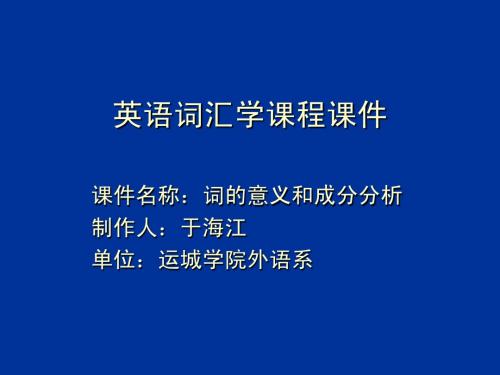
4. What is sense语义? sense语义? The sense of an expression is its place in a system of semantic relationships with other expressions in the language. 词语的意义是它在语义关系系统中同其它词 语相对的位置。
夏洋邵林主编英语词汇学教程unit5
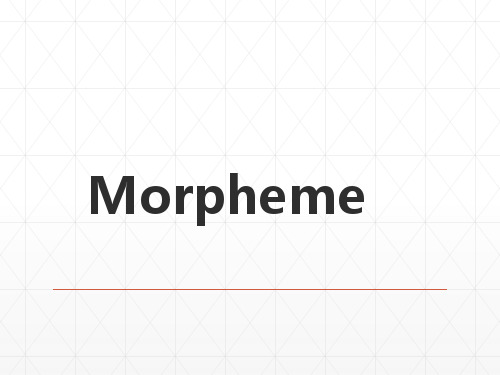
蟋蟀、蜘蛛、葡萄、蜈蚣、人、天 人民、机器、不吃 扩音机、水仙花、三轮车
Morpheme vs. Character 词素与字
▪ “X帝”是词素还是语素? ▪ 词素对于汉语分类是一个关键问题。如果解决汉语中的词素问题,即发现词素的表征特点,这对于汉语词类 研究应该有很重要的作用。 ▪ In Chinese, a morpheme is usu. a character. ▪ I. one character may be correspondent to more than one morphemes.一个汉字代表着几个不同的词素。 如:“副”这个字就起码代表三个词素——“副1”:表示“第二的、次级的”的意思;“副2”:表示“相配、相称”的意 思;“副3”:表示某种事物的计量单位。 ▪ II. One morpheme may be represented by more than one character.同一词素可以同时由不同的汉字来表示 如:“来吧”的“吧”也可以写成“罢”。 ▪ III. One character may involve two morphemes.一个汉字可以包含两个词素。
eg1: Give the noun forms of the following words. invent describe justify decide
Allomorph
key: invent + ion justify + cation
describe + tion decide + sion
re + act + ion act + ion re + act act
base
Practቤተ መጻሕፍቲ ባይዱce
英语词汇学第5章课件
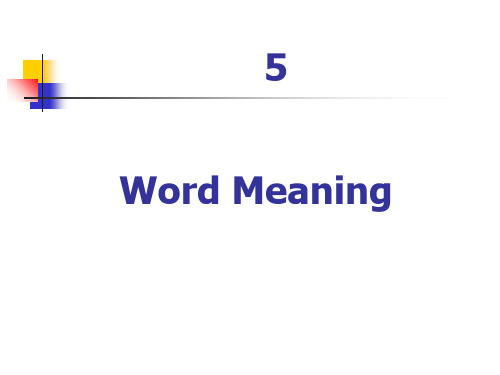
5. 2. 1. Onomatopoeic Motivation
Words whose sounds suggest their meanings = onomatopeic words
Two types of words according to their resemblance of sound:
Characteristics: 1. Different lexical items, which have
different lexical meanings, may have the same grammatical meaning: tables, men, oxen, potatoes
5. 1. 1. Concept
the meaning triangle
concept/idea
tnce
5.1.2 Concept
It is universal to all men alike regardless of culture, race, language and so on, whereas meaning belongs to language, so is restricted to language use.
1. Primary onomatopoeia
bow wow
ha ha
ping-pong miaow
cuckoo
tick-tuck
5. 2. 1. Onomatopoeic Motivation
2. Secondary onomatopoeia cock—crow duck—quack frog—croak mice—squeak horse—neigh goat—bleat
英语词汇学
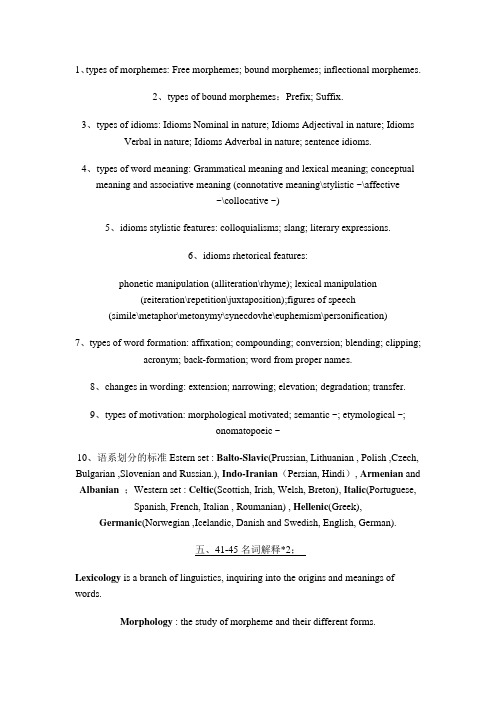
1、types of morphemes: Free morphemes; bound morphemes; inflectional morphemes.2、types of bound morphemes:Prefix; Suffix.3、types of idioms: Idioms Nominal in nature; Idioms Adjectival in nature; IdiomsVerbal in nature; Idioms Adverbal in nature; sentence idioms.4、types of word meaning: Grammatical meaning and lexical meaning; conceptualmeaning and associative meaning (connotative meaning\stylistic ~\affective~\collocative ~)5、idioms stylistic features: colloquialisms; slang; literary expressions.6、idioms rhetorical features:phonetic manipulation (alliteration\rhyme); lexical manipulation(reiteration\repetition\juxtaposition);figures of speech(simile\metaphor\metonymy\synecdovhe\euphemism\personification)7、types of word formation: affixation; compounding; conversion; blending; clipping;acronym; back-formation; word from proper names.8、changes in wording: extension; narrowing; elevation; degradation; transfer.9、types of motivation: morphological motivated; semantic ~; etymological ~;onomatopoeic ~10、语系划分的标准Estern set : Balto-Slavic(Prussian, Lithuanian , Polish ,Czech, Bulgarian ,Slovenian and Russian.), Indo-Iranian(Persian, Hindi), Armenian and Albanian;Western set : Celtic(Scottish, Irish, Welsh, Breton), Italic(Portuguese, Spanish, French, Italian , Roumanian) , Hellenic(Greek), Germanic(Norwegian ,Icelandic, Danish and Swedish, English, German).五、41-45名词解释*2;Lexicology is a branch of linguistics, inquiring into the origins and meanings of words.Morphology : the study of morpheme and their different forms.Semantics:the study of word meaning.Etymology: the study of the origin of words, and of their history and changes intheir meaning.Stylistics : the study of the variation in language which is dependent on the situation in which the language is used and also on the effect the writer or speaker wishes to create on the reader or hearerLexicography : the compiling of dictionaries.Synchronic study : the study of a word or words at one particular point in time.Diachronic study: a n approach to lexicology which studies how a word (or words)changes over a period of time.word: a word is a minimal free form of a language that has a given sound andmeaning and syntactic function.vocabulary:Vocabulary refers to the total number of the words in a language, but it can stand for all the words used in a particular historical period.Vocabulary also refers to all the words of a given dialect, given book, a given discipline and the words possessed by an individual person.Terminology术语consists of technical terms used in particular disciplines andacademic areas as in medicine:Jargon行话refers to the specialized vocabularies by which members of particular arts, sciences, trades and professions communicate among themselves such as inbusiness.slang俚语belongs to the sub-standard language, a category that seems to stand between the standard general words including informal ones available to everyoneand in-group wordsArgot黑话generally refers to the jargon of criminals. Its use is confined to the sub-cultural groups, and outsiders can hardly understand it,Archaism s古词语are words or forms that were once in common use but are nowrestricted only to specialized or limited use.Neologisms新词语are newly-created words or expressions, or words that havetaken on new meanings.denizen s同化词are words borrowed early in the past and now are well assimilatedinto the English language.Alien非同化词are borrowed words which have retained their original pronunciationand spelling.Translation-loans. 借译词Translation-loans are words and expressions formed from the existing material in the English language but modelled on the patterns taken fromanother language.Semantic-loan s借义词Words of this category are not borrowed with reference to theform. But their meanings are borrowed.Content word: the basic word stock is the foundation of the vocabulary ,which accumulated over centuries and forms the common core of the language. It is the mostimportant part of vocabulary.Creation : the formation of new words by using the existing materials, namely roots, affix es and other elements. Semantic change means an old form which takes on anew meaning to meet the new need.Morpheme: the smallest meaningful unit in a languageAllomorph: any of the different forms of a morphemeFree morpheme: a linguistic form which can be used on its own as a wordBound morpheme: a form (morpheme) which can not he used alone hut must be used with another morpheme. Bound morphemes include hound roots and affixesAffixes: forms that are attached to words or word elements to modify meaning or functionPrefixation(suffixation): is the formation of new words by adding prefixes(suffixes) to stemInflectional affixes: affixes attached to the end of words to indicate grammatical relationshipsDerivational affixes: affixes added to other morphemes to create new wordsRoot: a morpheme which is the basic part of a word that can not be further analyzed without total loss of identityStem: a form to which affixes of any kind can be addedBound root: a root that can not stand alone as a wordMonomorphemic words: words that have nothing more than a free morphemeAffixation: Derivation (also known as affixation) is the process of formation of words by adding word-forming or derivational affixes to stems. Affixaton consisits of prefixation and suffixation. Prefixation is the formation of new words by adding prefixes to stems; suffixation is the formation of new words by adding suffixes tostems.Compounding: Compounding or composition is the formation of new words by joining two or more stems. Words formed in this way tire called compounds.Conversion:Conversion is the formation of new words by converting words of one class to another class. Functional shift = conversion Zero-derivation .Adjective to noun :(1) full conversion (2) partial conversionAcronymy Acronymy is the process of forming new words by joining the initial letters of neames of social and political organizations or special noun phrases and technical terms Acronymy 包含两类:1) initialisms (不发音)e.g. BBC, VOA, TB2)acronyms (形成新的发音)e.g. CORE, TEFLBlending is the formation of new words by combining parts of two words or a won!plus a part of another word. Words formed by blending are called blends orpormanteau.Clipping is a way of making new words which involves the shortening a longer word by cutting a part off the original and using what remains instead.Back-formation is a process of forming new words considered to the opposite process of suffixation by the removal of an affix from existing word.Words from proper names of place, people, trade, book, etc.Concept,is beyond language, is the result of human cognition, reflecting the objectiveworld in the human mindSense : denotes the relationships inside the language.Reference is the relationship between language and the world。
英语词汇学课本与译文

Introduction 绪论0.1 The nature and Domain of English lexicology 英语词汇学的定义及研究范围Lexicology is a branch of linguistics, inquiring into the origins and meanings of words. 词汇学是语言学的一个分支,研究词汇的起源和意义。
English lexicology aims at investigating and studying the morphological structures of English words and word equivalents, their semantic structures, relations, historical development, formation and usages. 英语词汇学研究英语词汇的形态结构、词的对应及其语义结构、词义关系、词的历史演变、词的构成及词的用法等。
English lexicology is a theoretically-oriented course. 英语词汇学是一门理论性课程。
It is chiefly concerned with the basic theories of words in general and of English words in particular. 该课程主要论述词汇学的基本理论,特别是英语词汇的理论知识。
However, it is a practical course as well, for in the discussion, we shall inevitably deal with copious stocks of words and idioms, and study a great many usage examples. 但是,英语词汇学也是一门实践性课程,在该书的论述中,我们将遇到大量的词汇和习语,学习大量词汇用法实例。
- 1、下载文档前请自行甄别文档内容的完整性,平台不提供额外的编辑、内容补充、找答案等附加服务。
- 2、"仅部分预览"的文档,不可在线预览部分如存在完整性等问题,可反馈申请退款(可完整预览的文档不适用该条件!)。
- 3、如文档侵犯您的权益,请联系客服反馈,我们会尽快为您处理(人工客服工作时间:9:00-18:30)。
Classification: negative prefixes ununacceptable undemocratic
不能接受的,不受欢迎的 不民主的
Classification: non-negative prefixes
1. Degree, measures or size : What is ‘http’ like in hyper- (过多) ?
Classபைடு நூலகம்fication: non-negative prefixes
2. Repetition or possibility:
en- (使处于某种状态) em- (before p,b,m)
embark 乘船, 装载, 着手, 从事 enclose 圈起, 围住, 附上, 封入
Classification: non-negative prefixes
Classification: negative prefixes
nonnon-economic non-profit nonparty noncolor nontaster non-event 非经济的,无实用价值的 非盈利的 非党的,无党派的 原色,黑白色,非彩色 味盲 无效的事件*
an anticipated event that turns out to be far less significant than was expected大肆宣传而结果却名 不副实的事,无效的事件
postpostgraduate 大学毕业后,研究生 post-doctoral 博士后的 prepre-delivery 产前的,待产的 preliminary 初步的,预备的
Classification: non-negative prefixes
4. Attitude, counteraction:
Classification: negative prefixes
in- il- ir- imin- inadequate il- (before l): illegal ir- (before r): irresponsible im- (before p, b, m): imperceptible
Readings Task IV
• Chapter 12 of A Survey of English Lexicology • Key points in the book will be discussed next week
Lecture V Word Building – Derivation
English prefixes: classification
Greek: semi-; uni- (one); bi- (two); tri(three); quad- (four); quadri- (four); quin(five); sex- (six); sept- (seven); oct(eight); nona- (nine); dec- (ten); poly(many); centi- (100); milli- (1000); multi(many); hemi- (half); mono- (mon / one); bi- (two); tetra- (four); penta- (five); hexa(six); hecto- (hundred)
English suffixes: classification
-ist: economist -hood: adulthood, singlehood -ing: building, meaning, packing -ion/-sion/-tion/-ition/-ation: production, conclusion, realization -ism: consumerism, perfectionism -ment: agreement, investment -ness: effectiveness, kindness
English Lexicology
Review of Lecture IV
1. Morpheme Definition Identification 2. Root Free root Bound root 3. Affix Inflectional and derivational Prefix and suffix Origin and productivity 4. Allomorph
English prefixes: function
Prefixes modify the lexical meaning of the root; therefore, the simple word and its prefixed derivative usually belong to the same part of speech. Prefixes do not generally change the part of speech of a word but there are prefixes which do change the part of speech of the words.
English suffixes: classification
1. Noun-forming suffixes -age: passage, marriage, mileage -ance/-ence: assistance, predominance, correspondence -dom: freedom, kingdom -ee: employee, referee, absentee -eer/er: engineer, profiteer, manager -ess: manageress, heiress
Classification: negative prefixes
To give negative, reverse or opposite meaning
aapolitical 不关心政治的 asexual 无性的,无性生殖的 dedestabilize 动摇 declassify 消除…密级 disdisenfranchise 剥夺…的公民权 disinvest 减少投资
English suffixes: classification
-ship: ownership, friendship -ty/-ity: productivity, prosperity -ure/-ture: procedure, expenditure
English suffixes: classification
Derivation: definition
Derivation is a kind of word-formation when a new word is formed by adding a derivational morpheme (usually suffix or prefix) to the root.
English prefixes: classification
Latin: magnmalmedinonsemisubultunivia-
large, big, great bad, badly, wrong; ill; evil; abnormal middle nothing, not half, partly, twice under, below beyond, excessive, to an extreme degree one, single way, road, path
And hyperlink(电脑)超链接 what is ‘www’? hypertext(网络)超文本* http: hypertext transfer over- (超过) protocol 过高评价 www: world wide web
overestimate overcompensate 补偿过度
English prefixes: function
Prefixes changing the part of speech:
deenunantiinterpostpren. → v. n. → v. n. → v. n. → a. n. → a. n. → a. n. → a. deform, debug , defrost enslave, endanger unleash unearth anti-war, anti-carbon inter-state, inter-laboratory postwar, postliberation prewar, preplant
anti- : antiestablishment, antibody autoautodial 自动拨号 autonomy 自治,自主 countercountercharge 反诉 counteroffer 买方还价
Classification: non-negative prefixes
5. Pejoration:
Classification: non-negative prefixes
semi- (半) semiskilled 半熟练(工人);半技能(工人) semi-annual 每半年一次的,一年两次的 super- (超级) superintendant 监督员,管理员 supermarket 超市 ultra- (极端) ultra-conservative 极端保守主义的 ultra-secret 高度机密的
Lecture V Word Building – Derivation
1. Derivation: definition 2. English prefixes Function Classification 3. English suffixes Function Classification
